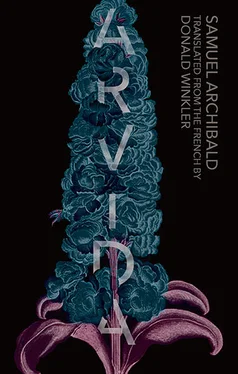I came from the ends of the earth with pebbles in my pockets.
They may have told you. They couldn’t have told you why. No one ever knew. Other than Reiko. I brought them to sow, like seeds, and carry with me a bit of my native landscape. You can plant pebbles where you like and nothing of them will sprout, nothing of them will grow, and that’s perhaps a sad notion for people here and elsewhere, but not for me. I spread them on the road one night, among pebbles just like themselves. The pebbles, like the landscapes, were the same. There was nothing of myself to bring here, and I didn’t come for that. I was far away now, where no one could ever find me, but I soon realized that I’d chosen the identical land, that I had always been, as here, remote from the world, and there would be no elsewhere, never an elsewhere, until I transcended myself.
The village was called Rausu, but the elders still called it Uembetsu, because it had for a long time borne that name. The summers were mild here and the village full of visitors, but the winters were terrible, just like where I’d come from, for months they cut off all of Hokkaido’s north coast from the world. That’s when I most liked the life here. There were the same long mountains everywhere, a bit soft, a bit lazy, that stretched out low in the landscape as far as the eye could see, and the trees were like at home, I won’t say where, black silhouettes that kept their needles for the whole year, and held the snow in their branches until they were like great soft ghosts frozen into the winter.
Reiko says:
It’s my uncle who took care of me after the boat carrying my parents sank to the bottom of the sea of Okhotsk. He was already looking after me before that, and as a little girl I felt as if my father, my mother and myself were dolls with porcelain faces on exhibit at the Inoué property, curios gathering dust while waiting for my uncle’s visits. My mother dusted and sewed. My father drank, in the village and at home, but was always able to eat with us in silence and to climb stiff-backed up to his room. When my uncle arrived, my parents became servants and I became the lady of the manor. Rausu was the summer estate of my uncle Inoué. He was the master and father and the unofficial mayor of the village, and he never came in the winter and it seemed that we ourselves in the winter didn’t really exist.
My uncle spent part of the summer with me, the little orphan. When cold began to creep into the air, he had the idea of finding this woman, Misaka, and asking her to be my governess. My uncle was rich. He did business in Sapporo. He had enough money to pay a governess for me, and enough money so that all I wore was silk. When I was small he said that I was the flower of Nemuro, the sub-prefecture, and that now I was the flower of Hokkaido, and when he spoke to me about this woman, he told me that with her lessons I would be both a true Japanese and a real American, that I could be the most beautiful woman on earth, both the flower of the Empire and of the entire world. When that became so, I would go to live with him in the capital and perhaps, one day, we would visit Paris, London and New York together.
She was a strange woman, Misaka. Tall. With red hair and green eyes. I’d never seen a woman like that, not in Rausu, but I recognized her right away. In front of my uncle she talked to me as to a little girl. She stroked my hair and I looked right into her eyes and I knew that deep down this woman didn’t like children. I saw that she’d never wanted life inside of her, but that she would have wanted me inside her, and that she wanted me for herself. So I played the flower of Hokkaido. I threw myself into her arms, smiling and hugging her tight. My uncle also smiled.
“I told you she’d love you, Misaka-sensei.”
Oh, you have every right to call me a liar and tell me I couldn’t feel that way when I was eleven. As for me, I have the right to stick out my tongue at you and tell you that you’re the liars, you’re the dogs.
2
Misaka says:
I can tell you how it all began.
I found her one morning, on her bed, naked from waist to feet, her thin legs and pink sex settled on the covers. She was in the midst of cutting a deep gash in the flesh of her right thigh with a tracing wheel. There was blood on the sheets, blood on her fingers, and blood at the corners of her lips. For that instant, for that instant only, I will be judged. I could have run to her and taken her in my arms and asked her why she was doing what she was doing, and told her it must end, told her I’d help her to stop, that I knew how to make her stop.
Instead, when she raised her eyes to me, when she asked me, “Is it bad, what I’m doing, Misaka?” I threw myself on her but I didn’t stop her. I told her that whoever wants to do that has the right to do it, and I told her she must never feel guilty nor be ashamed nor ever think that in punishing her body she was damaging someone else’s property. I embraced her, I enfolded her in my arms, and I let her bleed onto my clothes before disinfecting her wound and dressing it with gauze. After, I stood up before her, I slowly took off my clothes, and I showed her, among the scars left on my body by my wanderings and by men, the marks of all those wounds I’d inflicted on myself.
Reiko says:
Misaka was my father, my mother, my governess, my mistress, my doomed soul, and my initiator. That was no news to anyone, but what I want to say is that she was also, often, like my little girl, like a child who trembled and sobbed in my arms, because where pain was concerned I was better than her, in pain I was greater than her.
In the beginning, Misaka didn’t even know what jigai meant.
I’m the one who told her that spouses once committed ritual suicide by cutting the jugular vein, seated, legs tucked under their buttocks. Enemy soldiers found the villages they invaded emptied of all life, houses deserted, furnished only with low tables and dead women, upright and noble, their ankles bound tightly so that no soldier might be tempted to wrest from their dead bodies what, living, they could have taken from them by force. I’m the one who decided that together we would honour no tradition. It was I who resolved that we would not mutilate ourselves to deny ourselves to all, but to offer ourselves to each other. We would mutilate ourselves without dying, without ceremony, our legs spread wide.
Oh, you have every right to say it’s all false, that I couldn’t know all that, and that I ought not to be there to tell my story because I’m dead. As for me, I’ve every right to tell you that it’s you who knows nothing, you who are aware of nothing.
The men say:
We have a good idea of what happened down there, all that time, and we all know how it ended, but no one knows how it began. At first we didn’t notice anything. Reiko’s prolonged absence from among the children eventually caught the attention of the wives. It also became clear that Misaka-sensei and the little Inoué had not left the property for more than a year. Some men who had arrived at dawn one day sometimes opened the gates and came to buy provisions for them in the village.
While we were wondering, sitting at Akira Gengei’s one noon-hour, whether we ought to send someone to check things out, a child came in and said:
“Come see.”
Two women were crossing the village, limping, one supporting the other, swathed in large purple capes, their faces masked by hoods. They walked to the stream, then went back to the property without saying anything to anyone. The frightened children said that when they passed in front of them they saw their faces from underneath, and swore that they had no more noses nor lips nor eyelids, and that their faces were like those of yˉurei, like those of the dead. We would have liked to contradict them, but we’d all noticed that only three naked feet protruded from under their capes, and that on each, several toes had been chiselled off.
Читать дальше












